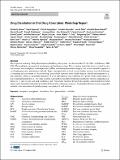Drug Dissolution in Oral Drug Absorption: Workshop Report
Author(s)
Raines, Kimberly; Agarwal, Payal; Augustijns, Patrick; Alayoubi, Alaadin; Attia, Lucas; Bauer-Brandl, Annette; Brandl, Martin; Chatterjee, Parnali; Chen, Hansong; Yu, Yuly C.; Coutant, Carrie; Coutinho, Ana L.; Curran, David; Dressman, Jennifer; ... Show more Show less
Download12248_2023_Article_865.pdf (786.5Kb)
Publisher with Creative Commons License
Publisher with Creative Commons License
Creative Commons Attribution
Terms of use
Metadata
Show full item recordAbstract
Abstract
The in-person workshop “Drug Dissolution in Oral Drug Absorption” was held on May 23–24, 2023, in Baltimore, MD, USA. The workshop was organized into lectures and breakout sessions. Three common topics that were re-visited by various lecturers were amorphous solid dispersions (ASDs), dissolution/permeation interplay, and in vitro methods to predict in vivo biopharmaceutics performance and risk. Topics that repeatedly surfaced across breakout sessions were the following: (1) meaning and assessment of “dissolved drug,” particularly of poorly water soluble drug in colloidal environments (e.g., fed conditions, ASDs); (2) potential limitations of a test that employs sink conditions for a poorly water soluble drug; (3) non-compendial methods (e.g., two-stage or multi-stage method, dissolution/permeation methods); (4) non-compendial conditions (e.g., apex vessels, non-sink conditions); and (5) potential benefit of having both a quality control method for batch release and a biopredictive/biorelevant method for biowaiver or bridging scenarios. An identified obstacle to non-compendial methods is the uncertainty of global regulatory acceptance of such methods.
Date issued
2023-11-07Department
Massachusetts Institute of Technology. Department of Chemical EngineeringPublisher
Springer International Publishing
Citation
The AAPS Journal. 2023 Nov 07;25(6):103
Version: Final published version